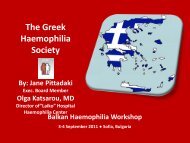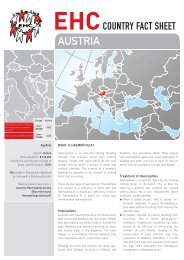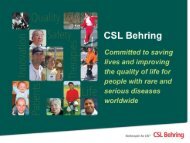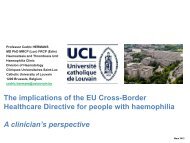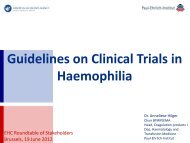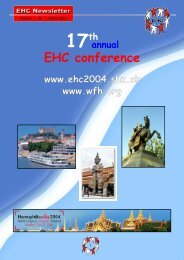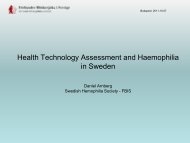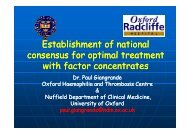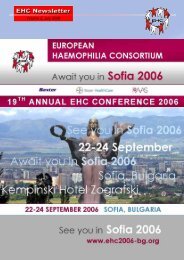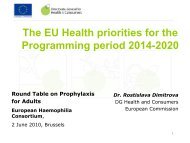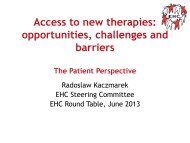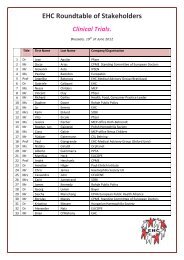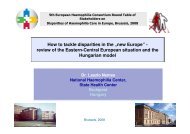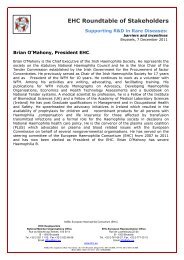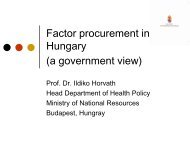2010 November - EHC
2010 November - EHC
2010 November - EHC
Create successful ePaper yourself
Turn your PDF publications into a flip-book with our unique Google optimized e-Paper software.
Haemophilia Care in Poland<br />
On 7th September <strong>2010</strong> an international conference “Haemophilia Care in Poland – Current State of<br />
Affairs” took place in Warsaw, Poland. The conference was jointly organized by the Polish<br />
Haemophilia Society and the <strong>EHC</strong>, and the Polish Minister of Health Ewa Kopacz was its official<br />
patron. The speakers included Dr Paul Giangrande, haematology consultant from Oxford Radcliffe<br />
Hospital, Brian O’Mahony, Chief Executive of the Irish Haemophilia Society, Dr Joanna Zdziarska, a<br />
haematologist from the University Hospital in Cracow, Poland, and Bogdan Gajewski, President of<br />
the Polish Haemophilia Society. Also representatives of people with haemophilia and some parents<br />
of children with haemophilia had a chance to express their opinions. The debate was efficiently<br />
moderated by journalist Malgorzata Wisniewska.<br />
The speakers underlined that the introduction of prophylactic treatment for children in 2008 was a<br />
very significant step forward in haemophilia care in Poland. However, there remained many<br />
problems to be solved.<br />
The most important were:<br />
� lack of comprehensive haemophilia care, including problems with access to physiotherapy;<br />
� lack of secondary prophylaxis for adults with serious joint changes;<br />
� wrong costing of medical procedures by the National Health Fund, which was the reason<br />
that hospitals often lost money when treating patients with haemophilia;<br />
� no comprehensive treatment for patients with inhibitors;<br />
� necessity of continuing the existing National Programme of Haemophilia Treatment, which<br />
will expire in 2011;<br />
� no access to recombinant factor concentrates.<br />
When referring to the latter point, Dr Giangrande stressed the fact that prices of plasma-derived and<br />
recombinant factor concentrates had become comparable, and in the most recent tender organized<br />
in the United Kingdom plasma-derived factor concentrates (bought only for patients with von<br />
Willebrand disease as otherwise British patients rely on recombinants) were more expensive than<br />
recombinants.<br />
<strong>EHC</strong> Newsletter| NOVEMBER <strong>2010</strong> 10



